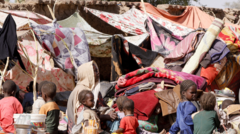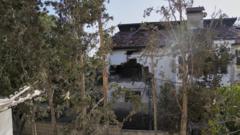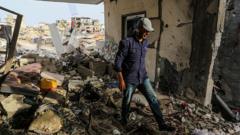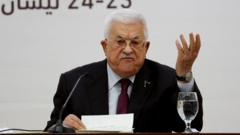In recent weeks, anti-Hamas demonstrations have surged in Gaza, with citizens openly expressing dissatisfaction with the armed group's rule. Critics blame Hamas for their dire circumstances, calling for an end to its governance as dissent emerges despite the risks involved.
Escalating Defiance: Palestinians Challenge Hamas’ Authority Amid Crisis

Escalating Defiance: Palestinians Challenge Hamas’ Authority Amid Crisis
Growing public protests in Gaza reveal increasing resentment toward Hamas, as citizens bear the brunt of escalating violence and economic struggles.
Amidst a backdrop of overwhelming despair, anti-Hamas protests are gaining traction across Gaza, reflecting significant public disillusionment with the group that has dominated the territory for nearly two decades. Recent demonstrations showcase a collective cry for change, with protesters chanting messages such as "Hamas is garbage," indicating a burgeoning spirit of opposition against the armed group's rule.
Many Gazans attribute the dire humanitarian and economic crisis to Hamas’ governance, declaring that their suffering is tied to the group's failures. "The world is deceived by the situation in the Gaza Strip," asserts Moumen al-Natour, a local lawyer and activist. Al-Natour, having lived through a significant portion of Hamas’ reign, has publicly condemned the group, insisting that their rule must end for peace to return. The fear of dissent is ever-present, as Hamas continues to quash opposition brutally, illustrating the high stakes for those daring to challenge their power.
The tragic case of Oday al-Rubai, who was killed after expressing concerns for his safety amid protests, underscores the dangers faced by activists. Al-Rubai’s family has publicly blamed Hamas for his murder, demanding accountability for what they see as a politically motivated killing. His death has galvanized public sentiment against the group, showcasing a growing resolve among citizens to voice their frustrations despite the risks involved.
In various neighborhoods, citizens are increasingly rejecting Hamas’ actions. Eyewitness accounts reveal instances where locals have intervened to prevent Hamas from launching attacks from civilian homes, underscoring a shift in public perception. In Beit Lahiya, for example, residents confronted armed militants, resulting in clashes where community members stood firm in their demand for peace and an end to violence.
While these protests remain unauthorized and potentially perilous, they signal a significant change in the political landscape of Gaza. As more citizens dare to express their discontent, the authority of Hamas appears increasingly fragile, raising questions about its future as the primary ruling body in the region. With Gaza embroiled in continued conflict, the people's cries for justice and change resonate, marking a pivotal moment in the region's tumultuous history.



















